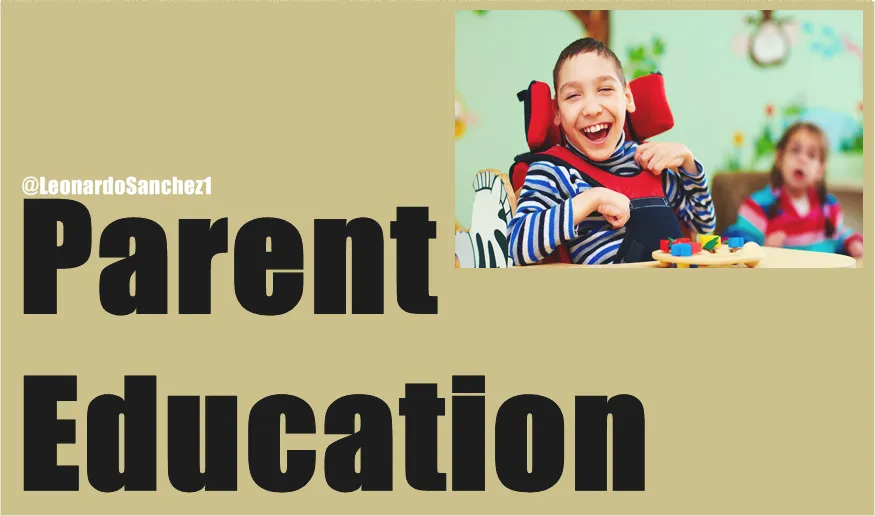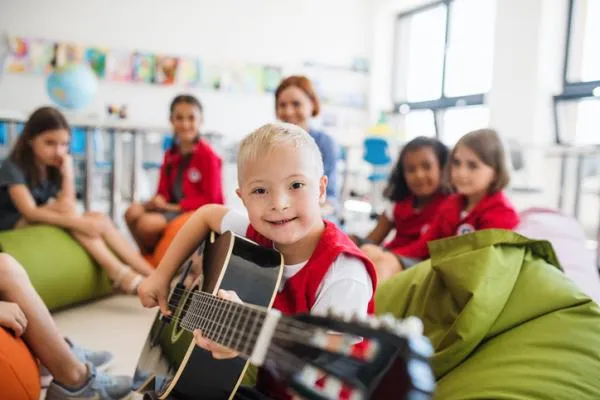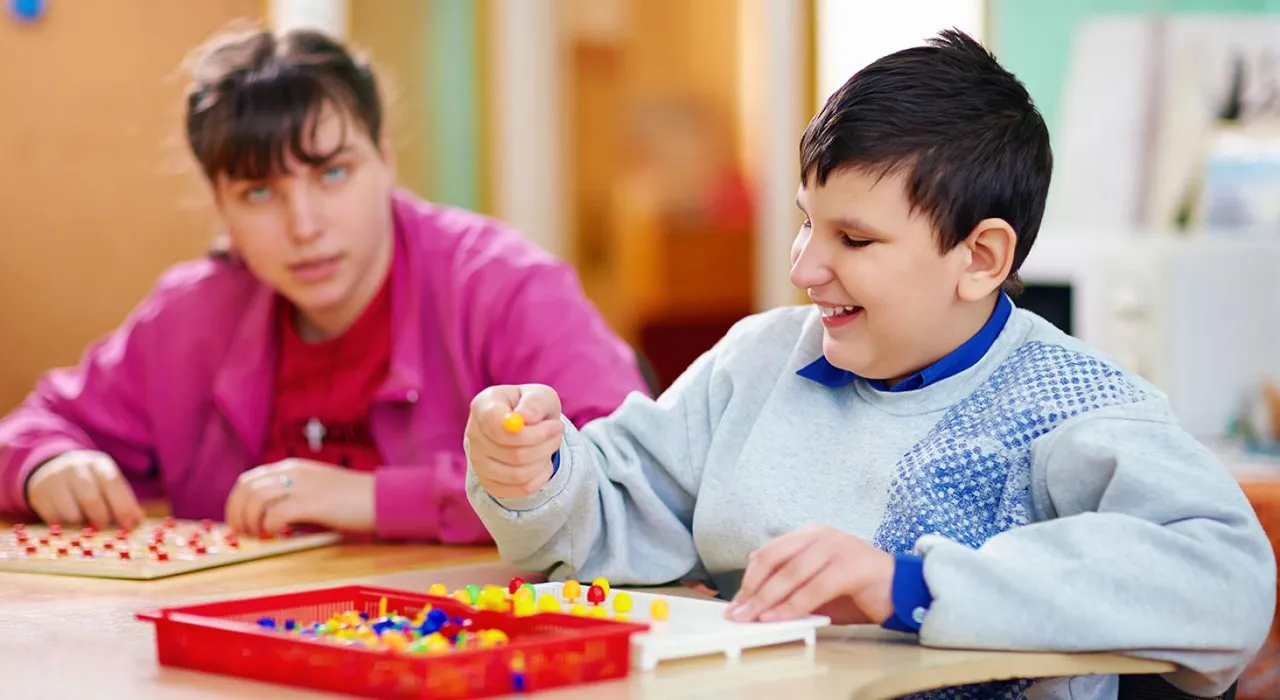Esta publicación está dividida en dos idiomas. La primera parte en Ingles y la segunda en español.
Esta publicación está dividida en dos idiomas. La primera parte en Ingles y la segunda en español.


What impact should parents of students with special needs have?
.
I would like to begin this writing by referring to the fact that no person is unaware of having a child with special conditions, whether mental retardation, autism, learning difficulties, among others. In fact, the Ministry of Education in Venezuela (1997) defines mental retardation as "a condition of organic or environmental origin that interferes with the functioning of the nervous system, which generally appears during childhood and may or may not be associated with other conditions" (p.3). In the above quote it can be noted that the cause for conceiving a special child can be organic or environmental, which allows a range of possibilities for any couple to conceive a child with these characteristics.
When this happens, it causes in many parents a great impact that is reduced to feelings related to the non-acceptance of having begotten a child with such a nature, which is reflected in their educational process, they are reluctant to be attended in an institution for children with special educational needs and instead look for a place in a classroom of the so-called "regular school".
It is also very common that many parents, after a diagnosis by a doctor, therapist or teacher, are filled with hope and cling to the search for normality for their children in the educational context. Well, let me tell you, dear parents or representatives, that it is often necessary and opportune to reflect, since it can bring positive aspects in our lives and, of course, in the special children.
Before I begin my reflections, I clarify that I base them on my direct experience with many parents and students with special educational needs, whose experiences have left me an academic learning experience and a great influence on my way of life. This has allowed me many times to criticize what the school, education, politics and especially parents have failed to do.



Reflections from/for parents.
A child with any genetic condition is a natural human being, pure and worthy of being valued and you are the main person in charge of doing so, so you must be aware of accepting your child or adolescent as he/she is, whether Down Syndrome, autistic, with multiple disabilities or with learning difficulties. Also if he/she spits, crawls or is hyperactive, as well as if he/she convulses.
My second reflection focuses on recognizing categorically that your children do not have a disease, they are not mentally ill, as I said at the beginning and I argued it with the quote, they have a condition of organic or environmental origin, that is to say they were born with the condition of being different or the others, like me, you and all human beings are different from each other, since no person is the same as another.
In the same vein, we must recognize that a person with special educational needs, from a humanistic-social perspective, is equal to everyone else. That is to say that humanly we are all equal and have the same rights, therefore the right to education, and that is where we must defend and strengthen the educational environment of the special child, but with the caveat that his learning pace is slower and with the prevention of creating an irritating and disturbing hostile environment for him when we want to place him in "regular classrooms".
Likewise, it is necessary to objectively place them in an educational institution for children with special educational needs, where previously it is convenient that each parent receives sufficient orientation to know which institution is the most appropriate for their own children to be educated.
In this same perspective, every parent should be aware that the entire education of their children is correlated with their family and community environment, where it is necessary to change certain life habits. That is, isolating the child from social events and family gatherings that the child has been able to interpret as a lack of freedom, i.e., the right and desire to constantly go out with their parents to parties, parks, beaches, etc. has been taken away, denying the enjoyment of having them locked up in a house, apartment or room as if they were a burden.
On the contrary, special children should make themselves known to their neighbors, in the bakery, the market, the neighborhood, the sidewalks, the streets, so that the community knows that they exist and that they are human beings like everyone else, capable of thinking, feeling and acting, so it is up to parents and the whole social environment to learn to discover them, to value their details, no matter how small or insignificant we may think they are.
In this sense we agree with Brant (2000), who in his work writes "the process by which the individual learns to develop in a given society is what is recognized sociologically as socialization" (p.49).



Conclusions and more
The arguments of this author define what should be done with these children and adolescents through the actions of parents and the community in general, including any government policy that addresses the educational and community context, where of course and obviously the role of the family should be included, since it is considered the main socializing agent.
There is no doubt that we must change confinement for outings, beatings for caresses and hugs, indifference for listening to them and attending to them, seeing them as abnormal and not as normal, thus and only thus would we be in correspondence with Brond (2000) when he says "social interaction is presented as a human need from the beginning of life. The physical and biological dependence of the child develops and stimulates affective and social dependence with its parents" (p49).
This last announcement by the author summons us to open our children and adolescents with an infinite space for learning and enjoyment of what life represents in school, family and community where the role of parents emerges as the main motivator and therefore socializer.
Thank you for reading me.



¿Qué impacto deben tener los padres de alumnos con necesidades especiales?
.
Quisiera comenzar este escrito haciendo referencia a que ninguna persona es ajena a tener un hijo con condiciones especiales, ya sea retraso mental, autismo, dificultades de aprendizaje, entre otras. De hecho, el Ministerio de Educación en Venezuela (1997) define el retardo mental como "una condición de origen orgánico o ambiental que interfiere con el funcionamiento del sistema nervioso, que generalmente aparece durante la infancia y puede o no estar asociada a otras condiciones" (p.3). En la cita anterior se puede observar que la causa para concebir un niño especial puede ser orgánica o ambiental, lo que permite un abanico de posibilidades para que cualquier pareja conciba un hijo con estas características.
Cuando esto sucede, provoca en muchos padres un gran impacto que se reduce a sentimientos relacionados con la no aceptación de haber engendrado un hijo con dicha naturaleza, lo que se refleja en su proceso educativo, se muestran reacios a ser atendidos en una institución para niños con necesidades educativas especiales y en cambio buscan un lugar en un aula de la llamada "escuela regular".
También es muy común que muchos padres, tras el diagnóstico del médico, terapeuta o profesor, se llenen de esperanza y se aferren a la búsqueda de la normalidad para sus hijos en el contexto educativo. Pues bien, permítanme decirles, queridos padres o representantes, que muchas veces es necesario y oportuno reflexionar, ya que puede aportar aspectos positivos en nuestras vidas y, por supuesto, en los niños especiales.
Antes de iniciar mis reflexiones, aclaro que las baso en mi experiencia directa con muchos padres y alumnos con necesidades educativas especiales, cuyas vivencias me han dejado un aprendizaje académico y una gran influencia en mi forma de vida. Esto me ha permitido muchas veces criticar lo que la escuela, la educación, la política y sobre todo los padres han dejado de hacer.



Reflexiones de/para padres.
Un niño con cualquier condición genética es un ser humano natural, puro y digno de ser valorado y tú eres el principal encargado de hacerlo, por lo que debes ser consciente de aceptar a tu hijo o adolescente tal y como es, ya sea Síndrome de Down, autista, con pluridiscapacidad o con dificultades de aprendizaje. También si escupe, gatea o es hiperactivo, así como si convulsiona.
Mi segunda reflexión se centra en reconocer categóricamente que tus hijos no tienen una enfermedad, no son enfermos mentales, como dije al principio y lo argumenté con la cita, tienen una condición de origen orgánico o ambiental, es decir nacieron con la condición de ser diferentes o los otros, como yo, tú y todos los seres humanos somos diferentes entre sí, ya que ninguna persona es igual a otra.
En este mismo sentido, debemos reconocer que una persona con necesidades educativas especiales, desde una perspectiva humanista-social, es igual a todos los demás. Es decir, que humanamente todos somos iguales y tenemos los mismos derechos, por tanto el derecho a la educación, y es ahí donde debemos defender y potenciar el entorno educativo del niño especial, pero con la advertencia de que su ritmo de aprendizaje es más lento y con la prevención de crearle un entorno hostil irritante y perturbador cuando queramos ubicarlo en "aulas regulares".
Asimismo, es necesario ubicarlos objetivamente en una institución educativa para niños con necesidades educativas especiales, donde previamente es conveniente que cada padre reciba la orientación suficiente para saber qué institución es la más adecuada para que sus propios hijos sean educados.
En esta misma perspectiva, cada padre debe ser consciente de que toda la educación de sus hijos está correlacionada con su entorno familiar y comunitario, donde es necesario cambiar ciertos hábitos de vida. Es decir, aislar al niño de los eventos sociales y de las reuniones familiares que el niño ha podido interpretar como una falta de libertad, es decir, se le ha quitado el derecho y el deseo de salir constantemente con sus padres a fiestas, parques, playas, etc., negando el disfrute de tenerlos encerrados en una casa, apartamento o habitación como si fueran una carga.
Por el contrario, los niños especiales deben darse a conocer a sus vecinos, en la panadería, el mercado, el barrio, las aceras, las calles, para que la comunidad sepa que existen y que son seres humanos como todos, capaces de pensar, sentir y actuar, por lo que corresponde a los padres y a todo el entorno social aprender a descubrirlos, a valorar sus detalles, por pequeños o insignificantes que nos parezcan.
En este sentido coincidimos con Brant (2000), quien en su obra escribe "el proceso por el cual el individuo aprende a desarrollarse en una sociedad determinada es lo que se reconoce sociológicamente como socialización" (p.49).



Los argumentos de este autor definen lo que se debe hacer con estos niños y adolescentes a través de las acciones de los padres y de la comunidad en general, incluyendo cualquier política gubernamental que aborde el contexto educativo y comunitario, donde por supuesto y obviamente se debe incluir el papel de la familia, ya que se considera el principal agente socializador.
No cabe duda que debemos cambiar el encierro por las salidas, los golpes por las caricias y abrazos, la indiferencia por escucharlos y atenderlos, verlos como anormales y no como normales, así y sólo así estaríamos en correspondencia con Brond (2000) cuando dice "la interacción social se presenta como una necesidad humana desde el inicio de la vida. La dependencia física y biológica del niño desarrolla y estimula la dependencia afectiva y social con sus padres" (p49).
Este último anuncio del autor nos convoca a abrir a nuestros niños y adolescentes un espacio infinito para el aprendizaje y disfrute de lo que representa la vida en la escuela, la familia y la comunidad donde el papel de los padres emerge como el principal motivador y por ende socializador.
Gracias por leerme.


Bibliography and references:
Brandt (2000) - Sociología general - Ediciones Eneva - Empire in Venezuela - Ministry of Education (1997) - Conceptualizacióny política para la atención educativa integral de la persona con retardo mental . Caracas . Venezuela.
Image sources: Cover image made with the free editing program PhotoScape - 2nd image - 3rd image
